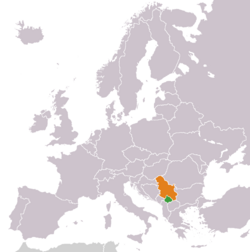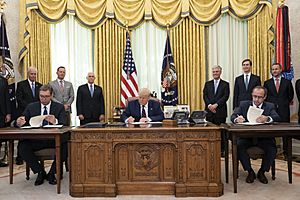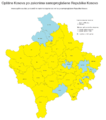Kosovo–Serbia relations facts for kids
 |
|
Kosovo |
Serbia |
|---|---|
| Diplomatic Mission | |
| Liaison Office of Kosovo, Belgrade | Liaison Office of Serbia, Pristina |
| Envoy | |
| Jetish Jashari | Dejan Pavićević |
Kosovo declared itself an independent country in 2008. However, Serbia strongly disagrees with this. Serbia still believes Kosovo is part of its own territory, calling it the Autonomous Province of Kosovo and Metohija.
Because of this disagreement, Kosovo and Serbia did not have much to do with each other at first. But over the years, they have started talking more and working together. This is called "normalizing relations."
Even though Kosovo is not a full member of the United Nations, many countries around the world recognize it as independent. Out of 193 UN member states, 104 recognize Kosovo.
The European Union has helped Kosovo and Serbia talk to each other. These talks led to the Brussels Agreement in 2013. This agreement aimed to make their relationship more normal. Both sides promised not to stop the other from joining the EU. They also agreed on how police would work in Kosovo and how local elections would be held. A plan for a group of Serb communities in Kosovo was also part of this agreement.
Later, the United States helped with more talks. In 2020, Kosovo and Serbia signed an agreement to improve their economic ties. This included making it easier for air, train, and road travel between them. Both countries are also expected to join a shared market called Open Balkan.
In February 2023, with the EU's help, both sides agreed to a new plan for normalizing their relationship. They also accepted a timeline for how to put this plan into action.
Contents
Working Towards Normal Relations
The 2020 Washington Agreement

On September 4, 2020, Serbia and Kosovo made a deal to improve their economic relationship. This agreement was helped by the United States.
The deal focused on making travel easier, including by train and road. Both sides also agreed to work with US banks to help their economies. They planned to join a group called the Mini Schengen Zone, which aims to make trade and travel simpler in the region.
The agreement also included plans for new train lines between cities like Niš and Pristina. They also looked into connecting the Belgrade-Pristina rail network to a seaport on the Adriatic Sea. A study was also planned for Gazivoda Lake, which is on the border between the two areas.
As part of this agreement, Serbia agreed to move its embassy in Israel to Jerusalem. Also, Israel and Kosovo agreed to recognize each other as independent countries.
The 2023 Ohrid Agreement
In December 2022, the European Union suggested a new agreement to Serbia and Kosovo. This plan was based on an earlier idea from France and Germany.
The main goals of this agreement were:
- Both sides would have "normal, good neighborly relations."
- They would recognize each other's official documents, like passports, diplomas, and car plates.
- Serbia would not stop Kosovo from joining international organizations.
- Kosovo would create a way for the Serb community there to manage some of their own affairs.
- Both countries would have permanent offices in each other's capitals.
The EU hoped this agreement would be signed by the end of 2023.
On February 27, 2023, the Prime Minister of Kosovo, Albin Kurti, and the President of Serbia, Aleksandar Vučić, agreed to the main ideas of this plan in Brussels. They met again on March 18 in Ohrid, North Macedonia, and verbally accepted a plan for how to put the agreement into action. This plan is now known as the "Agreement on the path to normalization between Kosovo and Serbia."
Official Representation
In 2013, as part of the Brussels Agreement, Serbia and Kosovo agreed to have special officers in each other's capital cities. These officers act like representatives.
Kosovo has a Liaison Office in Belgrade, Serbia. Serbia has a Liaison Office in Pristina, Kosovo. Both of these offices are hosted by the European Union.
The 2023 Ohrid Agreement, which both sides accepted, plans to upgrade these offices to "Permanent Missions." This means they would have a more official status, similar to embassies.
Sports and Minorities
Sports
Kosovo is a full member of many international sports organizations. This can sometimes cause problems when sports events are held in Serbia. For example, if Kosovo is supposed to compete as its own country, it can create tension.
Minorities
There are groups of people from both Serbia and Kosovo living in each other's areas. These are called minorities.
Many Kosovo Serbs had to leave their homes after the 1999 bombing of Yugoslavia. Some Serbian churches, cemeteries, and homes have also been damaged.
The Serbian government once promised money to Serb prison workers in Kosovo if they left their jobs in Kosovo institutions. They left, but they say they were never paid. This led to protests.
Serbs in Kosovo have also created their own local assembly to represent their interests. In 2013, the Serb government removed these assemblies in some northern towns as part of an agreement with Kosovo. At the same time, Kosovo's President offered amnesty to ethnic Serbs who had resisted Kosovo laws in the past.
Kosovo also pays attention to the Albanian minority in Serbia. These Albanians have asked for more rights, similar to the rights given to Serbs in Kosovo.
Images for kids
-
Hashim Thaçi, the Prime Minister of Kosovo (left), and Ivica Dačić, the Prime Minister of Serbia (right), with Michael Spindelegger (middle) in Vienna, 2013.
-
Ivica Dačić, the Prime Minister of Serbia (left), and Hashim Thaçi, the Prime Minister of Kosovo (right), with Catherine Ashton (middle) in Munich, 2014.
-
Municipalities of Kosovo as organized by the Republic of Kosovo.
-
Milun Trivunac, State Secretary of the Ministry of Economy of Serbia (sitting left), Richard Grenell, Special US Presidential Envoy for Serbia and Kosovo Peace Negotiations (standing right), Eset Berisha, Director of the Civil Aviation Authority of Kosovo (sitting right).
See also
- Foreign relations of Kosovo
- Foreign relations of Serbia
- Belgrade–Pristina negotiations
- Albania–Serbia relations
- Albania–Kosovo relations
- 2008 protests against Kosovo declaration of independence
- Kosovo Serbs
- Albanians in Serbia
- Serbo-Montenegrins in Albania
 | William M. Jackson |
 | Juan E. Gilbert |
 | Neil deGrasse Tyson |






